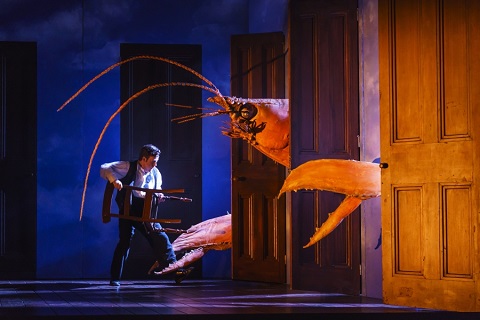
08 Mar 2019
WNO's The Magic Flute at the Birmingham Hippodrome
A perfect blue sky dotted with perfect white clouds. Identikit men in bowler hats clutching orange umbrellas. Floating cyclists. Ferocious crustaceans.
English Touring Opera are delighted to announce a season of lyric monodramas to tour nationally from October to December. The season features music for solo singer and piano by Argento, Britten, Tippett and Shostakovich with a bold and inventive approach to making opera during social distancing.
This tenth of ten Live from London concerts was in fact a recorded live performance from California. It was no less enjoyable for that, and it was also uplifting to learn that this wasn’t in fact the ‘last’ LfL event that we will be able to enjoy, courtesy of VOCES8 and their fellow vocal ensembles (more below …).
Ever since Wigmore Hall announced their superb series of autumn concerts, all streamed live and available free of charge, I’d been looking forward to this song recital by Ian Bostridge and Imogen Cooper.
The Sixteen continues its exploration of Henry Purcell’s Welcome Songs for Charles II. As with Robert King’s pioneering Purcell series begun over thirty years ago for Hyperion, Harry Christophers is recording two Welcome Songs per disc.
Although Stile Antico’s programme article for their Live from London recital introduced their selection from the many treasures of the English Renaissance in the context of the theological debates and upheavals of the Tudor and Elizabethan years, their performance was more evocative of private chamber music than of public liturgy.
In February this year, Albanian soprano Ermonela Jaho made a highly lauded debut recital at Wigmore Hall - a concert which both celebrated Opera Rara’s 50th anniversary and honoured the career of the Italian soprano Rosina Storchio (1872-1945), the star of verismo who created the title roles in Leoncavallo’s La bohème and Zazà, Mascagni’s Lodoletta and Puccini’s Madama Butterfly.
Evidently, face masks don’t stifle appreciative “Bravo!”s. And, reducing audience numbers doesn’t lower the volume of such acclamations. For, the audience at Wigmore Hall gave soprano Elizabeth Llewellyn and pianist Simon Lepper a greatly deserved warm reception and hearty response following this lunchtime recital of late-Romantic song.
Collapsology. Or, perhaps we should use the French word ‘Collapsologie’ because this is a transdisciplinary idea pretty much advocated by a series of French theorists - and apparently, mostly French theorists. It in essence focuses on the imminent collapse of modern society and all its layers - a series of escalating crises on a global scale: environmental, economic, geopolitical, governmental; the list is extensive.
For this week’s Live from London vocal recital we moved from the home of VOCES8, St Anne and St Agnes in the City of London, to Kings Place, where The Sixteen - who have been associate artists at the venue for some time - presented a programme of music and words bound together by the theme of ‘reflection’.
'Such is your divine Disposation that both you excellently understand, and royally entertaine the Exercise of Musicke.’
Amongst an avalanche of new Mahler recordings appearing at the moment (Das Lied von der Erde seems to be the most favoured, with three) this 1991 Mahler Second from the 2nd Kassel MahlerFest is one of the more interesting releases.
‘And there was war in heaven: Michael and his angels fought against the dragon; and the dragon fought and his angels, And prevailed not; neither was their place found any more in heaven … that old serpent … Satan, which deceiveth the whole world: he was cast out into the earth, and his angels were cast out with him.’
If there is one myth, it seems believed by some people today, that probably needs shattering it is that post-war recordings or performances of Wagner operas were always of exceptional quality. This 1949 Hamburg Tristan und Isolde is one of those recordings - though quite who is to blame for its many problems takes quite some unearthing.
There was never any doubt that the fifth of the twelve Met Stars Live in Concert broadcasts was going to be a palpably intense and vivid event, as well as a musically stunning and theatrically enervating experience.
‘Love’ was the theme for this Live from London performance by Apollo5. Given the complexity and diversity of that human emotion, and Apollo5’s reputation for versatility and diverse repertoire, ranging from Renaissance choral music to jazz, from contemporary classical works to popular song, it was no surprise that their programme spanned 500 years and several musical styles.
The Academy of St Martin in the Fields have titled their autumn series of eight concerts - which are taking place at 5pm and 7.30pm on two Saturdays each month at their home venue in Trafalgar Square, and being filmed for streaming the following Thursday - ‘re:connect’.
The London Symphony Orchestra opened their Autumn 2020 season with a homage to Oliver Knussen, who died at the age of 66 in July 2018. The programme traced a national musical lineage through the twentieth century, from Britten to Knussen, on to Mark-Anthony Turnage, and entwining the LSO and Rattle too.
With the Live from London digital vocal festival entering the second half of the series, the festival’s host, VOCES8, returned to their home at St Annes and St Agnes in the City of London to present a sequence of ‘Choral Dances’ - vocal music inspired by dance, embracing diverse genres from the Renaissance madrigal to swing jazz.
Just a few unison string wriggles from the opening of Mozart’s overture to Le nozze di Figaro are enough to make any opera-lover perch on the edge of their seat, in excited anticipation of the drama in music to come, so there could be no other curtain-raiser for this Gala Concert at the Royal Opera House, the latest instalment from ‘their House’ to ‘our houses’.
"Before the ending of the day, creator of all things, we pray that, with your accustomed mercy, you may watch over us."

A perfect blue sky dotted with perfect white clouds. Identikit men in bowler hats clutching orange umbrellas. Floating cyclists. Ferocious crustaceans.
When I last saw Dominic Cooke’s 2005 WNO production of The Magic Flute, in 2015, it was part of a spring tour entitled Spellbound. Now, revived by Caroline Chaney, it’s back under the umbrella of ‘Monarchy’ - and it’s a very Magrittian umbrella, decorated with a dash of Dalí.
Julian Crouch’s box-like set comprises three cloud-strewn walls each punctuated by three tall wooden doors. The rear wall - on the doors of which an eerie hand hangs three placards: Nature, Wisdom, Reason - lifts to provide depth and to sharpen the perspective. It’s visually enchanting but on this occasion, I found the design quite confining.
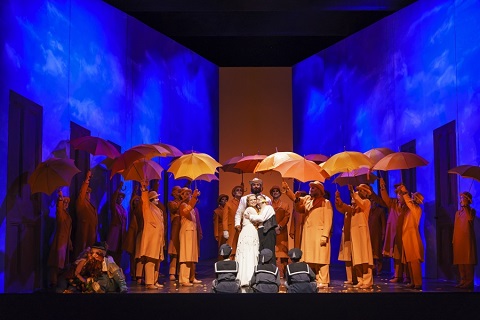 Photo credit: Bill Cooper.
Photo credit: Bill Cooper.
The Queen of the Night struggles to compel us from the darkness of the rear from which, swathed in smoke, she sings ‘O zittre nicht’. The Three Boys (who in this instance include one girl, Ruby Llewelyn) make their first appearance through the doors stage-left, though two of the sailor-suited lads didn’t quite come fully onto the set, remaining half-obscured by the half-opened doors; and, later, when they sailed on floating penny-farthings, the Boys cycled vigorously but went nowhere fast. Sarastro’s band of brothers rise up through trapdoors from nether regions, but only as far as their necks, and the effect was - at least for those seated quite close to the Hippodrome stage - a sea of disembodied singing bowler hats waggling orange umbrellas to signal their accord with Sarastro’s proposal that Tamino should join their brotherhood. There is a lot door-opening and -closing, and entering and exiting, but the overall impression was a general lack of movement. There was little sense of travels or trials; even the ferocious animals are lulled to stillness, rather than enchanted dancing, by Tamino’s magical flute.
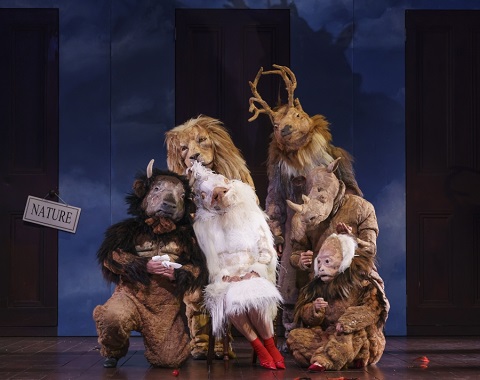 Photo credit: Bill Cooper.
Photo credit: Bill Cooper.
This puts a lot of responsibility on the cast and chorus, and instrumentalists, to create animation and convey the characters’ emotional journeys. Fortunately, WNO have gathered together some fine singers, several of whom are reprising their roles from previous runs. Mark Stone was a relaxed and worldly Papageno. His diction was unfailingly clear, his projection easy and there was a cheeky but beguiling touch of softly serenading sentimentality to his baritone. Stone’s humour was delivered with a mild urbanity which was slightly at odds with Papageno’s ruffled appearance. But, it was impossible not to warm to this genial and honest bird-catcher. Who would not delight when he netted himself his longed-for mate - a female ‘entirely like him’ (mir ganz gleich)? And as Stone and his Papagena (a bright and chirpy Claire Hampton) excitedly gathered up their rapidly multiplying progeny that were thrust through the trap-doors, who would not smile, perhaps a little wryly, at such a ‘happy ending’?
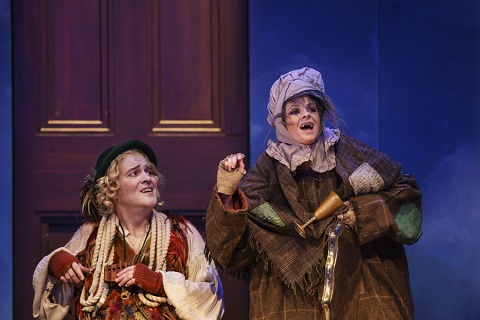 Mark Stone (Papageno) and Claire Hampton (Papagena). Photo credit: Bill Cooper.
Mark Stone (Papageno) and Claire Hampton (Papagena). Photo credit: Bill Cooper.
It’s hard, too, to imagine a more ideal Pamina than Anita Watson. Her rich, silky soprano wrapped itself lovingly around Mozart’s delicious melodies, and Watson’s well-shaped phrasing created strong character and spirit. ‘Ach, ich fühl’s’ managed to be heart-wrenching without Watson lingering overly long on the aching phrases, and she and Stone blended well in ‘Bei Männern welche Liebe fühlen’. Ben Johnson took a little longer to make his mark as Tamino, but his vocal characterisation grew in strength and Johnson’s pleasing tone captured the freshness of youth and newly discovered love.
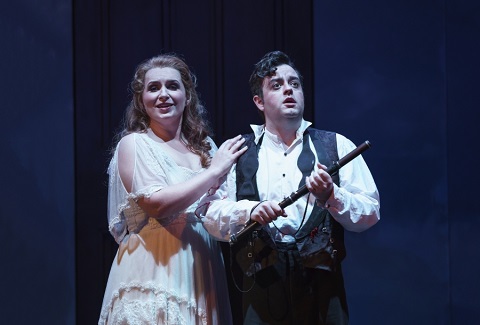 Anita Watson (Pamina), Ben Johnson (Tamino). Photo credit: Bill Cooper.
Anita Watson (Pamina), Ben Johnson (Tamino). Photo credit: Bill Cooper.
Anna Siminska reliably punched out the top notes - sparkling like the stars that we don’t actually see in this production - in ‘Der Hölle Rache kocht in meinem Herzen’, but I found her tone a little cold and her phrasing inflexible in the lower regions of her voice. Her Three Ladies were spirited: flirtatious and competitive rivals in displaying their ‘care and compassion’ for Tamino. along with a flash of suspender belt under their lady’s-maid aprons. Emma Carrington once again impressed as the Third Lady and she was very competently joined by Jennifer Davis and Kezia Bienek, vivacious First and Second Ladies respectively.
Jihoon Kim, replacing James Platt here in Birmingham, doesn’t really have the full lower notes to excel as Sarastro, and his effort to reach them sometimes resulted in a slight fuzziness, but Kim did his best to convey Sarastro’s gravity and compassion, even if the authority of his spoken text was marred by some distorted vowels. Howard Kirk’s Monostatos was no cartoon buffoon, and all the better delineated for the relative understatement; Kirk sang his aria cleanly and persuasively. I was impressed by Philip Rhodes’ Speaker, and Joe Roche and Laurence Cole put in fine performances as the First and Second Armed Man.
The Chorus sang with vigour and warmth, and conductor Thomas Blunt (standing in for Damion Iorio for these Birmingham performances) drew crisp playing from the WNO Orchestra.
I hope that Opera Today readers will indulge a digression to conclude, for Cooke’s visual surrealism got me thinking. The moral ambiguities of The Magic Flute - the implied racism and, even stated, misogyny - can be hard to reconcile today. Similarly, the opera’s apparent Enlightenment discourse sits oddly alongside its disturbing currents of irrationality. Such discrepancies have given scholars plentiful food for thought and speculation: Mozart’s opera has been explored from the perspective of 18th-century Freemasonry, and through the lens of Freud and Jung. Interpreting its esoteric symbolism in an article entitled ‘Layers of Meaning in The Magic Flute’, Joscelyn Godwin (Musical Quarterly 1999) proposed that we should see Pamina as Tamino’s anima - the feminine side of his spiritual nature - and Monostatos as Sarastro’s shadow, the dark side of his apparent benevolence.
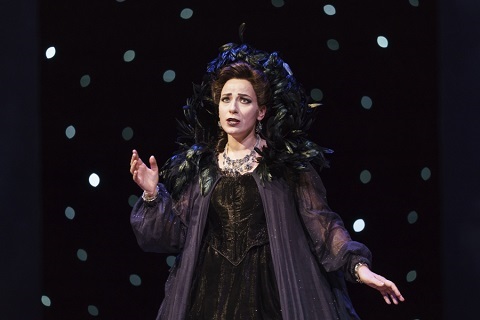 Anna Siminska (Queen of the Night). Photo credit: Bill Cooper.
Anna Siminska (Queen of the Night). Photo credit: Bill Cooper.
The principle of patriarchy has certainly proved one of the opera’s more problematic elements, leading Catherine Clément to argue, ‘If there is an opera that clearly shows, with all its verbal and musical power, the crushing symbolics of men over women, it is The Magic Flute.’ Citing the initiation of Pamina, others have rejected such accusations of anti-feminism.
So, what does this WNO production have to say in this regard, and might Cooke’s surrealism prove instructive? David Pountney suggests, in his programme note, that Mozart and Schikaneder’s Singspiel looks forward to a time when ‘man and woman, as represented by Tamino and Pamina, will rule together as equals’, seeming to agree with the late Rodney Milnes’ view that, ‘The synthesis of all the warring elements will herald a new, golden age of peace and wisdom’. Perhaps. But #MeToo suggests that such a future is still a utopian dream - as Pountney himself allows, ‘After over 200 years, we are still waiting for this future’.
Perhaps one day, a director will be brave enough to place the Queen of the Night on the side of moral righteousness and to make Sarastro the ‘bad guy’. Ingmar Bergman, in his film of the opera, made some gestures in this direction, as his unpublished film script (discussed by Rose Laub Coser in ‘The Principle of Patriarchy: The Making of The Magic Flute, inSigns, Winter 1978), reveals: ‘There is a disdain for women in The Magic Flute which is difficult to cope with’ and to get around this ‘we have changed the text a bit …’.
One can’t get away from the fact that whereas the male sphere in the opera is associated with clarity, truth and reason, and Sarastro’s music is composed and balanced, the female domain is characterised by darkness, deception and disorder. The threat of feminine irrationality is perfectly embodied by the Queen of the Night’s opera seria excess and contortions. But, perhaps the surrealism that Cooke employs as engaging visual decoration, could be used to probe deeper and more critically: to undermine connections between words, image and reality, and to subvert Sarastro’s professed ‘reason’ and ‘wisdom’. After all, Tamino and Pamina inhabit a frightening half-reality - dream or nightmare? - journeying through a Jungian wonderland of the subconscious and unconscious. And, like a fairy tale The Magic Flute plunders archetypal symbolism which is ripe for surrealist re-invention.
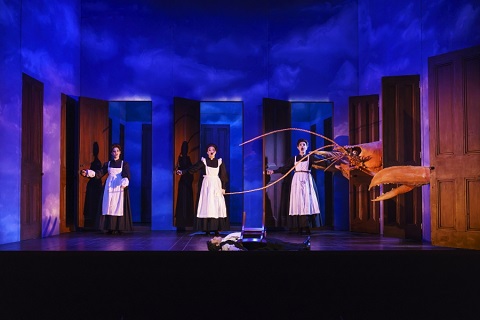 Three Ladies: Jennifer Davis, Kezia Bienek, Emma Carrington. Photo credit: Bill Cooper.
Three Ladies: Jennifer Davis, Kezia Bienek, Emma Carrington. Photo credit: Bill Cooper.
Umbrellas, bowler hats and umbrellas, depicted in a plain and conventional surface style, may intimate darker depths of the psyche. As Magritte explained, the bowler hat was the generic symbol of the bourgeois man, ‘The bowler…poses no surprise … It is a headdress that is not original. The man with the bowler is just middle-class man in his anonymity.’ But, surrealism makes the familiar strange. We think we know who the man in the bowler hat is, but do we really? The WNO programme reproduces Matisse’s Le Faux Miroir, which intimates wonder and fear: the eye both sees and reflects the world calling into question identity and the limitations of human vision. Moreover, in ‘Salvador Dalí’s Lobsters: Feast, Phobia, and Freudian Slip’ Nancy Frazier discusses Dalí’s use of lobsters as a symbol of danger and castration. In 1939, one of the exhibits in Dalí and George Platt Lynes’ photographic collaboration during the New York World’s Fair was entitled The Dream of Venus. One photograph depicted a nude female body across whose pelvic area was placed a lobster, the claws of which can lacerate other objects which, Frazier suggests, lends itself to become the perfect surrealistic symbol for castration. Moreover, the lobster only becomes vibrant orange-red when it is dead and powerless. Such reflections add a whole new dimension to Cooke’s rampaging crustaceans.
Claire Seymour
Mozart: The Magic Flute
Tamino - Ben Johnson, First Lady - Jennifer Davis, Second Lady - Kezia Bienek, Third Lady - Emma Carrington, Papageno - Mark Stone, Queen of the Night - Anna Siminska, Monostatos - Howard Kirk, Pamina - Anita Watson, Priest - Simon Crosby Buttle, Sarastro - Jihoon Kim, Speaker - Phillip Rhodes, First Armed Man - Joe Roche, Second Armed Man - Laurence Cole, Papagena - Claire Hampton, Three Boys - Cameron Lewis, Luke Samra and Ruby Llewelyn; Director - Dominic Cooke, Conductor - Thomas Blunt, Revival Director - Caroline Chaney, Staff Director - Sarah Crisp, Set Designer - Julian Crouch, Original Movement Director - Sue Lefton, Costume Designer - Kevin Pollard, Orchestra and Chorus of Welsh National Opera.
Birmingham Hippodrome; Thursday 7th May 2019.